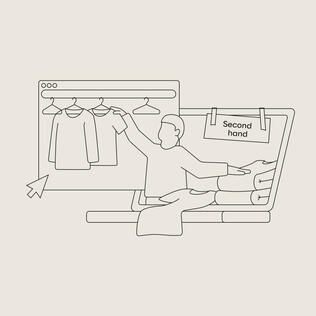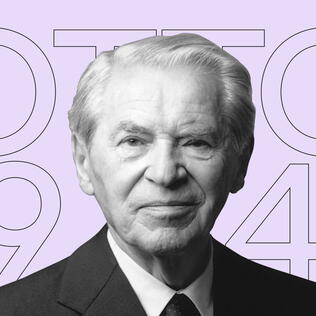Guided by values: "Trust is the most significant currency."

A conversation about values with Alexander Birken, CEO of the Otto Group From “Regarding Values” (...) by Sven H. Korndörffer and Christiane Harrienhausen.
What values have a special meaning for you and why?
That is not an easy question to answer. If I am to reduce my set of values to a common denominator, then it is truthfulness that guides me the most. I grew up influenced by Christianity and have been participated in a lot of Evangelical work among youth. The Christian understanding of making the best out of yourself and always affording this freedom to other people is one of the key principles that has molded me. To me, truthfulness means harmonizing my values with my thinking, speaking, and actions to the greatest extent possible. I deeply believe that this truthfulness is perceived as integrity by others and enables me and those around me to trust one another when we interact. Trust is the most important currency and something we urgently need more of in a time of great change and considerable mutual mistrust.
What values does a company need for long-term success on the market? Does appreciation also bring about added value?
When I started out at the Otto Group a few decades ago, my employment contract, which I was so proud of, was made of rather thick, gray, and – well – ugly paper. On my first day at work, it was explained to me how I was supposed to carefully sort my waste. Only gradually did I come to understand what entrepreneur Michael Otto and the company were all about: Carefully handling the world’s resources and contributing to the protection of flora and fauna in big and small ways. At the time this was unusual, revolutionary even.
How is this belief apparent in the Otto Group today?
Nowadays, everyone is talking about sustainability or about the English buzzword corporate responsibility. Just like before, the question today is still about what approach is best when managing a company. I am fascinated by the brainchild of those who originally founded the Federal Republic of Germany: the social market economy. It harmonizes both values that can and should characterize business actions: freedom and responsibility. For one thing – and this is what business is supposed to be all about – the freedom to bring goods and services to customers with innovative spirit, creativity, and economic considerations. And, for another, designing this with the people in mind at all times – whether customers, colleagues. or business partners – thereby focusing on humanity’s major challenges, such as globalization, digitization, and climate change. This is the challenge, which is the reason why I want to speak about an eco-social market economy today.

Do you think that a paradigm shift is occurring in this respect right now?
Understanding self as part of society and therefore part of the problem and the solution of the big issues of our time is being demanded of society more and more. I am deeply convinced that responsible actions by an industry or a company will sooner or later seen as its license to operate. We are already experiencing this with young colleagues, who insist on the meaningfulness of their actions being tied to the values that are propagated in the company and – even more importantly – visibly lived out. In the future, appreciation for the economic challenges will define the internal values of companies, goods, and services and will become a competitive advantage over other companies that are driven exclusively by shareholder values. In my view, this will lead to very excellent opportunities, particularly for companies with a European set of values.
Digitization continues to advance. Do we need new values in our new digital world, which is changing the lives of us all at incredible speed?
This is a very exciting question, one that I have been discussing in earnest with a group of very diverse colleagues over the last few months. As a group of companies that is closely affected by the digitization of consumers, business models, and competitive arena, we are experiencing the need to fundamentally call our current type of management, organization, and processes into question. This is the reason why we have undergone profound changes through a comprehensive transformation process in the last four years. The transformation of the culture of our interaction was more important to us than mere superficial restructuring. We have learned that the particularly the attitude of managers and executives needs to change substantially in order to give rise to participative, collaborative, and agile processes.
What does this mean specifically?
We do not need new values, but instead a revival of older values: prudence, authenticity, and a new understanding of diversity that not only accepts differences between people but also perceives opportunities, to mention only three. The topics of responsible action are becoming broader in this age of digitization. Many people worry whether they will be able to cope with the accompanying changes. The handling of data and grappling with the future of work are the two areas that, according to experts, we as the Otto Group are expected to provide solutions. For this reason, we have initiated a dialog with stakeholders on these topics – in order to deliver value contributions. If we want to tackle the increasingly evident trust crisis in society and maintain a value-oriented lifestyle and work ethic, it will be necessary to have a total societal transformation where we include everyone who is involved in the process.
Value training is one of the great challenges of our time. What value concepts do young people enter life with today, and are these value concepts future-oriented?
I do not believe that the values of the younger generation differ fundamentally from those of the older generation. They are only lived differently. I have observed this not least because of my own children. I find that the younger generation today is very motivated and dedicated. On the one hand, the evolving of one’s own individuality takes center stage, as does meaningful personal development. On the other hand, a much greater community spirit prevails than I observe among older generations. I find both of these together quite favorable and, yes, of course this is a future-oriented combination. It also has an effect on our societal togetherness, on the future of our work, and on our business culture. We all have to move forward. Social interaction, living together with others, and interacting with other cultures must undergo a definitive change. We have to become more open and courageous. We must learn to let go, to be more tolerant, and to create more open spaces if we want to solve our societal problems for the long-term and master the digital transformation. As always, young people are now looking for role models. While they may know more than a some experienced managers, practical knowledge is still of great importance and thus is highly valued. All in all, it is vital that we bring about the changes lying before us intergenerationally and together.
According to trend research, ethical consumption is becoming more and more of a mainstream phenomenon. Customers are increasingly ready to pay a little more for sustainably produced goods. How far will this development go?
The responsibility of companies increasingly goes beyond the environmental and social quality of their products and services. Attitude and foresight are required. The trend of ethical consumption has been observable for many years. The consumers’ focus has changed radically in this respect. They are no longer satisfied in merely doing something good for themselves. In their consumption of good and services, they have an increasing desire to do something to benefit others. Indeed, this has noticeable consequences for companies now: Those that demonstrably harm the environment and nature are becoming less and less competitive. The trust placed in companies that do not actually believe in and adhere to the customers’ values is quickly lost. And those that ignore their responsibility for the common good are sometimes even boycotted. Ultimately, what is at stake here is the “license to operate.”
The coronavirus pandemic has shaken society to its core over the last few years. How has customer behavior changed in your opinion?
Retail business will need to deal with consumer reticence for the foreseeable future. The return is very clear: Whoever has to spend massive total amounts on fuel, oil, foodstuffs, costs of living lacks money for other expenses. Everyone will have to deal with this situation in the short and medium term. We were already seeing an end to the corona boom even before the war in Ukraine. At the same time, however, we at the Otto Group are laying a very solid foundation with millions of new customers. Thus, while not as dramatically as in the previous two years, online business will continue to expand.
Corruption, intrigues, nepotism: A look at the globalized world does not exactly boost faith in the existence of a functioning value system. How can we successfully live out values in a world that is anything but perfect?
The business elite has always been guilty of overt wrongdoing. Yet, in light of the high degree of transparency that all societies have with the Internet, I believe that this will no longer be accepted and will rightfully be scandalized. This makes it even more of a challenge for entrepreneurs and businesses to regain trust. This cannot be done with strong words and vibrant campaigns but instead with increased hard work in the company’s own machine room, with a high degree of honest and transparent communication and an attitude of clearly seeking to offer solutions far the broader picture and outside of one’s own filter bubble. Doing this requires a clear position, courage, and the readiness to make actual change.
The world now finds itself an a major crisis. Not only the war in Ukraine but also the climate crisis are making many people anxious. What role do companies have in these uncertain times?
It is a fact that companies have always been part of society and thus do not act without affecting everyone else. We are part of the problem, but we can also be part of the solution. In other words: We have an economic responsibility and are increasingly called upon to turn this responsibility into specific actions. Just two examples: More and more consumers are expecting companies to offer products and services that will protect the environment and people too. And more and more and employees want to work for a company that, alongside purely economic goals, is also active in a meaningful way and seeks to have a positive effect on life together in society. We have taken on this task at Otto Group, as we have also done in the past. We will only be able to overcome the great challenges of our time – starting with climate change – with a mutual feat of strength.
Alexander Birken
Born in 1964 in Hamburg, Germany, he has been the CEO of the Otto Group since January 1, 2017. Previously, as a member of the Executive Board he was responsible for the strategic development of various companies in the Otto Group. He began his career at Philips Medical Systems after earning his degree in business administration at Wirtschaftsakademie Hamburg. In 1991, Birken joined the Otto Group Controlling division. From 1998 to 1999, he assumed responsibility for Otto Group Investment Controlling in the American and Asian markets. Birken led global Investment Controlling for the Otto Group from 1999 to 2002. From 2002 to 2004, he worked as Chief Operating Officer of the Spiegel Group in Chicago, USA. Since 2005, Birken has been a member of the Executive Board of the Otto Group. He bore operational responsibility for Human Resources and IT at OTTO. Alexander Birken is married and is the father of four children.
This interview was expanded with current questions; it originally appeared in:
Sven H. Korndörffer and Christiane Harriehausen (Ed.):
Regarding Values
FAZ Buch, 2020,
With kind permission by the FAZ-Verlag.
https://fazbuch.de/produkt/apropos-werte-haltung-orientierung-erfolg/





